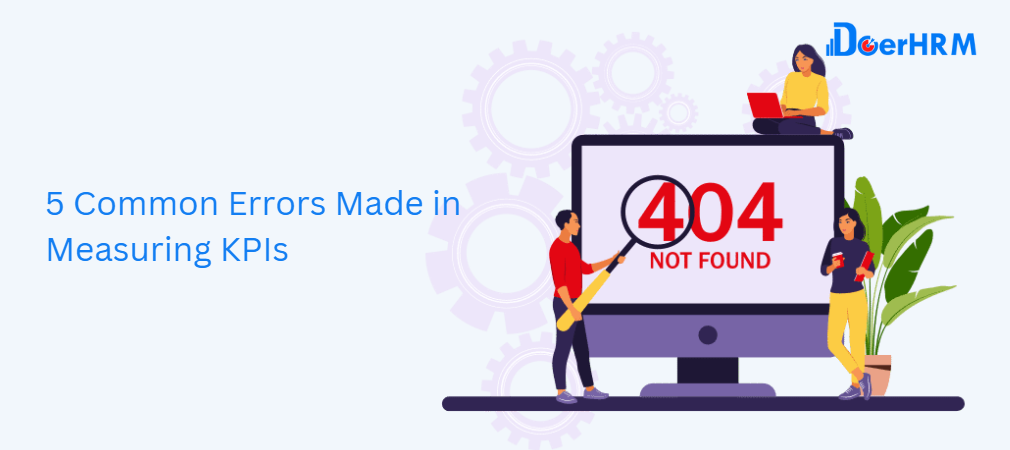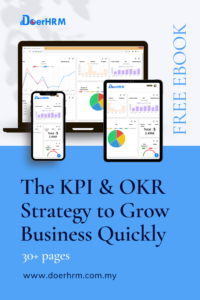It’s very important to keep an eye on the health of your organisation, and key performance indicators (KPIs) are great tools for doing so. These metrics can help you find places to improve, make sure you’re reaching your goals, and make decisions about the direction of your business that are based on facts.
But it’s also important to be aware of any problems that could come up when tracking KPIs. Focusing too much on these metrics can lead to unintended results.
How can it go wrong to track KPIs?
We love KPIs. We even made software to help you keep track of them. But, like any other powerful tool, KPIs can do much damage if used carelessly. When tracking key performance indicators, there are five common KPI mistakes that organisations make:
- Misalignment with company goals: If the KPIs you’re tracking doesn’t match up with the overall goals and objectives of your company, it can cause your efforts and resources to go in the wrong direction.
- Narrow view: If you focus too much on one key performance indicator (KPI) or a small number of KPIs, you might not pay attention to other important parts of your business. This can cause a lack of balance and an over-reliance on a few metrics.
- Data that is wrong or can’t be trusted: If the data you use to track your KPIs is wrong or can’t be trusted, it can lead to wrong conclusions and bad decisions.
- Unintended results: Keeping track of certain KPIs can sometimes have unintended consequences, like encouraging unethical behaviour or hurting employee morale.
- Lack of context: It’s important to think about the situation in which your KPIs are being measured, because the same metric may mean different things in different situations.
What are the common errors made in measuring KPIs?
As was said above, keeping track of KPIs is important for business because it shows how well the company is doing at meeting its goals.
If your key performance indicators (KPIs) are not specific enough or are defined in a way that is too broad (e.g., increase in profit, decrease in churn rate, etc.), they can’t be measured, and as a result, they are worthless.
We often forget that for KPIs and business goals to be effective, they need to be written with SMART criteria in mind. So, your KPI needs to be clear, measurable, doable, realistic, and have a deadline.
For example: “Increase conversion rate by 10% in the next three months” or “Increase return on ad spend (ROAS) by 40% in the next two months.”
Think about the KPIs that you would use to measure success.
KPI Mistake #1: Keeping tabs on too many KPIs
Tracking “everything that moves” is another mistake. Even though it sounds like nothing bad could happen, this common mistake could hurt the way your business does. When you try to be successful in a lot of different ways at once, your performance suffers a lot.
So, instead of being the best at the most important things, the company is average at all of them because its performance is either bad or average. So, keeping track of KPIs that have nothing to do with your main goals won’t help you reach them.
To avoid this problem, each strategic goal should have no more than 3–5 KPIs.
KPI Mistake #2: No responsibilities defined
It’s important to pick a person or a group of people to be in charge of each KPI. This will make it much easier to keep track of KPIs.
If you don’t do this step, you might end up with poor results.
Make sure you choose a KPI owner. This person will be in charge of reaching the goal and keeping track of the KPI.
KPI Mistake #3: Pay attention to the steps, not the results
Companies often lose sight of the main point of tracking KPIs by putting more emphasis on the process than on the results themselves.
As was already said, KPI is the metric that shows how well your company is doing at meeting its strategic goals. Because of this, it is very important that KPIs help you focus on the results you want.
The purpose of KPIs is to keep you motivated and focused on reaching the strategic goals that have been set. The more specific this goal and KPI are, the more likely it is that your team will be able to reach it.
If you track KPIs that don’t focus on specific results, you risk having bad performance.
KPI Mistake #4: No link between strategic goals and KPIs
When setting up KPIs, people often make the mistake of defining KPIs that have nothing to do with the strategic goals that are already in place. In this case, KPI is no longer useful and can be thrown out. So, keeping track of these KPIs is just a waste of time.
So, if you want to be successful, make sure there is a strong link between your strategic goals and your KPIs. By making sure this is in place, you improve your chances of success.
KPI Mistake #5: Using the same KPIs as other companies
This problem is very connected to the last one. It might seem easy to just copy the KPIs that most companies in your industry are already tracking. Even more so, it makes sense to use the same KPIs as your benchmark.
There are, however, some KPIs that are important to track no matter what your business strategy is. For example, there are five must-track marketing KPIs. However, it is always important to define the KPIs that are specific to your strategy. These KPIs will be your unique ways to measure success.
If you copy other companies’ KPIs without making sure they fit with your strategy, you might end up tracking something that isn’t important to you at all. Make sure that the KPIs you are tracking are relevant to your case.
How to choose the right KPIs for your business?
- Make sure your KPIs are linked to your strategic goals
Make sure that your KPIs are linked to your strategy and your goals before you set them up. By keeping track of KPIs, you can make sure that the company stays focused on its main goals.
- Define a maximum of 3-5 KPIs per strategic goal
Remember that it’s better to focus on 3–5 main goals and make progress in those areas than to try to reach 20 goals all at once. Also, make sure that not all of your KPIs depend on things outside of your company.
- Pay attention to the results
Make sure that when you set up your KPIs, they are focused on the results you want, not the process. Ask yourself, “What KPI would show that the strategy worked?” By keeping track of KPIs that are based on concrete results, you can make it more likely that you will reach your strategic goals.
- Use SMART criteria to define KPIs
Make sure that your KPIs are clear, measurable, doable, realistic, and have a deadline. When keeping track of KPIs, make sure to think about these things.
- Define responsibilities
Make sure that each KPI has a person in charge of it. This way, you can be sure that people will work harder and the results will be better.
Today, we looked at the most common mistakes that people make when setting up KPIs and keeping track of them. We hope it was helpful and that you won’t make these mistakes again.







